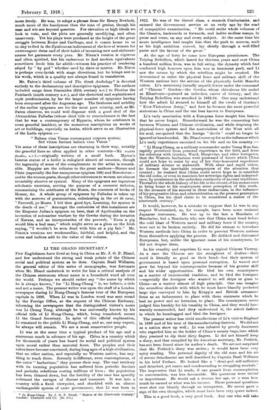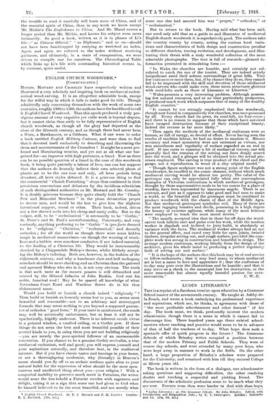LI THE GRAND SECRETARY.* FEW Englishmen have lived so long
in China as Mr. J. 0. P. Bland, and few understand the strong and weak points of the Chinese social and political system as he does. Captain Basil Williams, the general editor of this series of monographs, was fortunate when Mr. Bland undertook to write for him a critical analysis of the Chinese statesman whose name is a household word all over the world. Perhaps we should rather say " the name by which he is always known," for " Li Hung-Chang " is, we believe, a title and not a name. The present writer was upon the staff of a London newspaper during Li Hung-Chang's famous tour of the European capitals in 1896. When Li was in London word was sent round by the Foreign Office, at the request of the Chinese Embassy, informing the newspapers that the distinguished 'visitor's name was Li Chung Tong, although he was universally known by his official title of Li Hung-Chang, which, being translated, meant Li the Grand Secretary. In spite of this official explanation, Li remained to the public Li Hung-Chang, and so, one may expect, he always will remain. We are a most conservative people.
Li was at the same time a typical product of his age and a statesman much in advance of his age. China is a country which for thousands of years has based its social and political system upon moral rather than material force. The peoples and their rulers have become convinced, during long ages of a high civilization, that no other nation, and especially no Western nation, has any- thing to teach them. Serenely indifferent, even contemptuous, of the outer " barbarians," they pursue their way. The vast territory with its teeming population has suffered from periodic famines and periodic rebellions costing millions of lives ; the population has been thinned down, but the fertility of the race has speedily redressed the ravages of disease and massacre. It was into a country with a fixed viewpoint, and shackled with an almost unchangeable system of caste government, that Li was born in • IA Hung-Chaw. By J. 0. P. Bland. " Makers of the Nineteenth Century," London : Constable and Co. [6s. net.] 1822. He was of the Literati class, a staunch Confucianist, sad entered the Government service at an early age by the road of competitive examination. " He could recite whole volumes of the Classics, backwards or forwards, and indite endless essays, in prose and verse, on any and every subject. At the same time his acute intelligence had taught him that the path to success, such as his high ambition craved, lay chiefly through a well-filled purse and the favour of the great."
At the age of forty he came into European prominence. The Taiping Rebellion, which lasted for thirteen years and cost China a hundred million lives, was in full swing, the dynasty which had conferred high honours upon him was in imminent peril, and Li saw the means by which the rebellion might be crushed. He determined to enlist the physical force and military skill of the Western nations into the service of the physically feeble Manchu rulers. Li's mercenary (usually unpaid) forces under the command of " Chinese " Gordon—the Gordon whose chivalrous life ended at Khartoum—pursued an unbroken career of victory, and the Taiping Rebellion was smashed in 1863-64. One may understand how the adroit Li secured to himself all the credit of Gordon's " Ever-Victorious Army," and how he became the most powerful statesman in China and the one best known to Europeans.
Li's early association with a European force taught him lessons that he never forgot. Henceforward he was the connecting link between Western and Chinese civilization, and while despising the physical-force system and the materialism of the West with all his soul, recognized that the foreign " devils " could no longer be ignored or bamboozled. Mr. Bland sums up for us the influence which Li's early experiences exercised on his life and on his country :-
" Li Hung-Chang, as a military commander under Tseng Kuo-fan, rapidly perceived from personal experience in the field, and from his relations with Gordon, Ward, Burgevine, and other foreigners, that the Western barbarians were possessed of forces which China could not hope to resist by any of her time-honoured expedients of military science or statecraft. With clear and rapid vision, he foresaw the inevitable consequences of the situation thus created ; he realised that China could never hope to re-establish the old order, or even to maintain her sovereign rights and independ- ence, by persistence in the unbroken continuity of ancient traditions. Thereafter the whole history of his life is the record of his endeavours to bring home to his countrymen some perception of this truth. In the measure of his success in those endeavours, in the influence of his progressive ideas and administration on the present generation in China, lies his chief claim to be considered a maker of the nineteenth century."
It would, however, be a mistake to suppose that Li was in any respect Westernized, as, for example, have been some eminent Japanese statesmen. He was up to the last a Mandarin of Mandarins, but a Mandarin who saw that China must bend before the cold blast of Western naval and military force if the country were not to be broken entirely. He did his utmost to introduce Western methods into China in order to prevent Western nations from themselves applying the process. He disliked and distrusted Europeans, but, unlike the ignorant mass of his countrymen, he did not despise them.
In his venality and nepotism Li was a typical Chinese Viceroy. As a race the Chinese are the straightest of dealers—their word is literally as good as their bond—but their system of government is based upon personal corruption. Li waxed and grew fat beyond his contemporaries because of his greater skill and his wider opportunities. He bled his own countrymen as a matter of immemorial tradition, and he bled the foreigner —especially the foreigner who wanted to sell ships or guns to China—as a matter almost of high principle. One can imagine the soundless chuckle with which he must have blandly pocketed large tips conveyed to him by Krupp's and British armament firms as an inducement to place with them contracts which he had no power and no intention to place. His countrymen never judged him harshly for his venality in China, and they would have warmly commended, had they understood it, the adroit fashion in which he humbugged and bled the foreigner.
The present writer has vivid recollections of Li's visit to England in 1898 and of his tour of the manufacturing districts. We did not as a nation show up well ; Li was infested by greedy huxterers who regarded him as the holder of China's money-bags, into which they yearned to clip their dirty fingers. Li did not himself keep a diary, and that compiled by his American secretary, Mr. Pethick, has not been found since its author's death. We are not surprised that Mr. Pethick's diary was stolen ; it would have been. very spicy reading. The personal dignity of the old man and his air of serene detachment are well described by Captain Basil Williams in his brief Preface. He looked like a " demi-god .self-sufficient and detached, yet suave and condescending to struggling mortals." The impression that Li made, if one passed from contemplation to conversation, was less favourable. His questions were trivial or impertinent. He would ask a woman her age, or a man how much he earned or what was his income. These personal questions were shot out bluntly through an interpreter. He never gave a sign of his own thoughts, which must have been very queer indeed.
This is a good book, a very good book. Any one who will take
the trouble to read it carefully will learn more of China, and of the essential spirit of China, than in any work we know except Mr. Michie's The Englishman in China. And Mr. Bland covers a longer period than Mr. Michie, and knows his subject even more intimately. So good a book, written as it is in phases of Li's life—" as Chinese Official," " as Diplomat," and so on—should not have been handicapped by carrying so wretched an index. Again and again we referred to the index without receiving guidance, and ultimately, in a state of exasperation, we were driven to compile one for ourselves. The .Chronological Table which links up Li's life with outstanding historical events is, by contrast, quite useful.



































 Previous page
Previous page